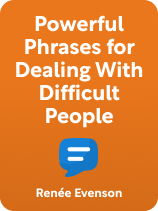

This article is an excerpt from the Shortform book guide to "Powerful Phrases for Dealing With Difficult People" by Renee Evenson. Shortform has the world's best summaries and analyses of books you should be reading.
Like this article? Sign up for a free trial here.
Do you have an unresolved conflict in your life? What’s the best way to approach it without making the situation worse?
In Powerful Phrases for Dealing with Difficult People, Renée Evenson emphasizes the importance of creating a conflict resolution plan before engaging in challenging conversations. She provides practical strategies to help readers navigate tense situations with empathy and composure.
Read on to discover how you can develop a robust conflict resolution plan and improve your communication skills when things get tense.
Plan How You’ll Resolve the Conflict
Evenson explains that conflicts of any kind are often emotionally charged—it’s natural to feel hurt, angry, or defensive if you believe someone has wronged you. However, if you confront the other person while strongly feeling these emotions, you’re likely to escalate the situation, triggering intense emotional reactions. Thus, the two of you will be less likely to cooperate and look for a mutually satisfying resolution.
Instead, when you first realize that resolution is necessary, take some time to calm down, analyze the situation rationally, and make a conflict resolution plan before talking to the other person.
| Calm Down and Plan, Even If You’re in a Good Mood Everson warns that initiating conflict resolution while in a bad mood will escalate the conflict. However, in some cases, it can also be harmful to start conflict resolution if you’re in too good of a mood. Travis Bradberry and Jean Greaves note in Emotional Intelligence 2.0 that when in a great mood, you’re more prone to making hasty decisions without thinking them through, which could also escalate a conflict. For example, imagine you’re feeling ecstatic after receiving a surprise bonus for outstanding performance. This confidence boost motivates you to impulsively confront a co-worker who’s had an annoyingly loud electric fan running on their desk for weeks. However, because you rush into this conflict resolution, you end up aggressively accusing the person you’re confronting in front of other co-workers, embarrassing them and triggering a furious reaction. This ruins your chance at collaboration, like getting the office to turn down the thermostat. Instead, you should have taken time to make a rational plan once you decided conflict resolution was necessary. |
We’ll explain why empathy is vital when planning for conflict resolution. Then, we’ll describe how to mentally rehearse for conflict resolution. We’ll also cover what to do if someone surprises you with a confrontation and you don’t have time to plan.
Practice Empathy While Planning
Evenson recommends that, during this planning time, you should re-examine the situation from the other person’s point of view. It’s easy to assume that someone has deliberately wronged you or is being unreasonable, but this isn’t always the case. If you consider alternative explanations, you may realize that the conflict is the result of a misunderstanding, and they had valid reasons to act how they did. Empathizing with the other person will help you remain calm and solution-oriented during the conflict resolution.
For example, imagine you discover that your co-worker scheduled a meeting with your entire team without you. Initially, you feel enraged because you assume that they intentionally excluded you, knowing that you’d disagree with their strategy proposal. However, after imagining the situation from their perspective, you realize that you mentioned you needed to concentrate on uninterrupted work this week. They were probably excluding you out of courtesy. This helps you approach your co-worker from a place of calm and understanding.
(Shortform note: In The Gardener and the Carpenter, Alison Gopnik contends that you can train yourself to consider alternative explanations beyond your first assumptions by reading fiction. In fiction, you see from the point of view of characters very different from yourself, strengthening your capacity for empathy and helping you understand a broader variety of perspectives. This skill is called counterfactual thinking.)
Mentally Rehearse the Conflict Resolution
Evenson notes that in addition to preparing emotionally, you should plan whatever practical details of the conflict resolution you can. Think through the points you want to make and anticipate the other person’s potential reactions. Mentally rehearsing a calm and constructive conflict resolution will make it easier to act that way during the conversation.
(Shortform note: While mental rehearsal can equip you to better handle conflict resolution, this habit can be harmful if you’re prone to anxiety. When some people try to predict how a conversation will go, their minds conjure up frightening worst-case scenarios. Consequently, they feel more anxious and stressed instead of confident and well-prepared. If this happens to you, remind yourself that an imperfect conflict resolution isn’t the end of the world, and try to move on.)
How to Plan After Someone Confronts You
Evenson warns that taking time to reflect on the situation can be particularly difficult if someone surprises you with a confrontation. This can happen if you’ve offended someone without realizing it. When someone angrily confronts you, you’ll likely feel defensive: You’ll want to immediately deny their accusations and make some of your own to get even.
Instead, try your best to stay calm. Let the other person get everything off their chest before speaking—interrupting them will only frustrate them further. Furthermore, show the other person that you’re genuinely listening: They’ll be more likely to cooperate if it seems like you understand their grievances and empathize with them.
| Dealing With Passive-Aggressive Confrontations In The Laws of Human Nature, Robert Greene notes that sometimes, others may surprise you with passive-aggressive confrontation: They try to manipulate you in a way that doesn’t look like direct aggression, so they can convince themselves and others that they’re innocent. For example, they may do something to upset you, but when you try to address it, they’ll make you feel like you’re overreacting or being too sensitive. This can cause you to get angry and defensive, making you look like the “bad guy.” Greene notes that if this happens, it’s especially important to stay calm. As this example illustrates, passive-aggressors’ strategies often revolve around manipulating your emotions. If they don’t get the reactions they want from you, they’ll realize their tactics aren’t working and they’ll hopefully stop being passive-aggressive. Unlike Evenson, Greene doesn’t seem to believe that genuinely listening to the aggressor will convince them to empathize and cooperate with you. He suggests that instead of spending time and emotional energy trying to understand them, you should do everything you can to avoid people who habitually act passive-aggressively. |

———End of Preview———
Like what you just read? Read the rest of the world's best book summary and analysis of Renee Evenson's "Powerful Phrases for Dealing With Difficult People" at Shortform.
Here's what you'll find in our full Powerful Phrases for Dealing With Difficult People summary:
- The downsides of avoiding conflict
- How to keep people from getting defensive
- What to do before you attempt conflict resolution






